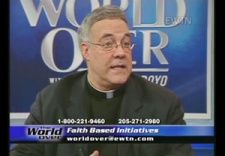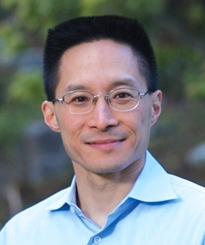I first met Father Robert A. Sirico at a conference in western Connecticut 13 years ago. Sirico is a big man who bears a family resemblance to the character Paulie Walnuts on The Sopranos—his older brother, actor Tony Sirico, played the part—and his commentaries have frequented the Wall Street Journal and other high-profile media outlets. His writing sparkles, but the talent is marshaled in the service of basically one thing—promoting pure, unbridled capitalism.
At that conference in the summer of 1999, I interviewed Sirico and asked a question that alluded to his “conversion”—the priest had related that as a young man in the 1970s, he led a dissolute, confused (and left-leaning) life, before committing himself ultimately to the Catholic faith of his childhood in Brooklyn. I was thrown off a little when he replied, “Which conversion?” Sirico had also told me about his turn toward free-market thinking (in his twenties), but I hadn’t realized that he saw this change of political perspective in such a religious light.
There were two conversions: to the Lord, and to Lord Acton’s classical liberalism (which came first, chronologically). John Acton was the 19th century English Catholic historian who stressed above all other human values the liberty to “do our duty unhindered by the state [and] by society.” In 1990, Sirico founded the influential and amply funded Acton Institute for the Study of Religion and Liberty, headquartered in Grand Rapids, Michigan, with offices in Rome. The think tank, which he still leads, concerns itself specifically with economic liberty and wealth creation.
What brings this pastor of plenty to my attention again is a superb series last week by Michael Sean Winters in his Distinctly Catholic blog at NCR Today, the valuable daily online offering of the National Catholic Reporter. Winters debated Sirico on January 28 at the Aquinas Institute for Catholic Thought in Boulder, Colorado, and in his blog, he responded in three parts to Sirico’s 2012 book, stalwartly titled, Defending the Free Market: The Moral Case for a Free Economy (Regnery Publishing).
Not So Neutral
Sparse reporting on the debate indicates that one of Sirico’s prime contentions was that the market is “morally neutral”—that “the human actors in the market must bring good morals to it.” What’s needed, he said, is individual virtue and “moral transformation,” not government regulation.
This is a refrain often heard from the free-market choir. The logicians in that loft argue that any problems associated with unregulated capitalism must be caused not by the system itself (being morally neutral), but by individuals who lack good values. All too often, the problematic individuals are identified as those who don’t succeed in the marketplace because of alleged moral failings including a dim work ethic. These are, of course, the 47 percent.
Here’s (partly) how Winters countered the notion of morally neutral markets in his second installment:
Let us look at the behavior the market requires. What values does it celebrate? Who are its heroes? The market celebrates the self-made man, not the man who evidences solidarity. The market, drenched in Calvinistic roots, celebrates frugality and thrift, not gratuitousness and generosity. The market requires self-assertiveness, not self-surrender. The market is all about activity and not at all about contemplation. The market evidences competition not cooperation. The morals of the market leave out fully half of the Christian moral framework!
Put that way, the market doesn’t sound very neutral at all.
You’d expect to see a lively critique of Sirico in the liberal National Catholic Reporter. You might not expect the same from a review in First Things, but that’s what Edward Skidelsky has delivered in the January 2013 edition of that unmistakably conservative religious journal. Skidelsky is a young British Anglican (“Anglo-Catholic,” he specifies) moral philosopher who draws significantly on Roman Catholic social teaching. Here’s his final verdict:
Defending the Free Market is, if I may be permitted to speak as a European, a very American book. Only in America has Christianity reached so complete an accord with market imperatives. “The free economy is a dream worthy of our spiritual imaginations,” writes Sirico in his introduction. Perhaps, but it was not the dream of St. Benedict or St. Francis, nor even of Luther and Calvin.
Only in America! (Note the conflicting asides on Calvin in the Winters and Skidelski pieces—I have to agree with the Anglican on that point; see my “Calvinism 2.0”).
Who Laughs Last?
There may be a bit of American Catholic exceptionalism lurking here as well. I’m not saying Catholic opinion has skewed in any appreciable way toward Sirico’s brand of libertarianism. The U.S. Catholic hierarchy, however, has at times given the impression that the primordial biblical issues of peace and the poor aren’t all that pressing, compared to such matters as the minutiae of HHS regulations on access to artificial contraception through private health insurance plans. In that way, leading bishops have helped nurture a sort of social-justice-teaching vacuum, arguably opening up greater space for market fundamentalism, whose Catholic disciples include Sirico and Congressman Paul Ryan. They and others would find little such opportunity in the European Catholic context.
And then there’s the broader skewing of U.S. public policy toward the wealthy over the last few decades, aided by that American Christian “accord with market imperatives” (although Skidelski might be painting with an overly broad brush on that score). These aren’t rough times for those who bless unfettered markets.
My fellow native Brooklynite Robert Sirico is getting panned left and right by thoughtful commentators. But is he also getting the last laugh?
This item was first posted yesterday at Tikkun Daily.







